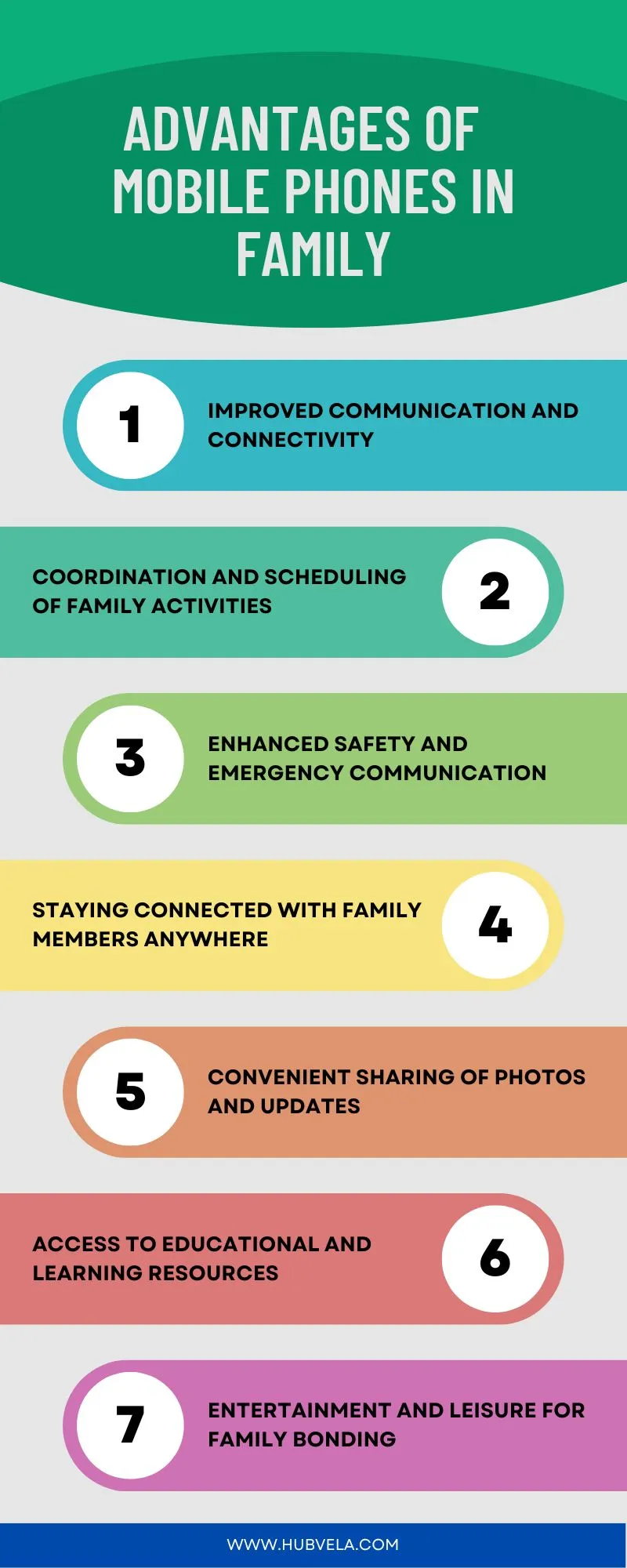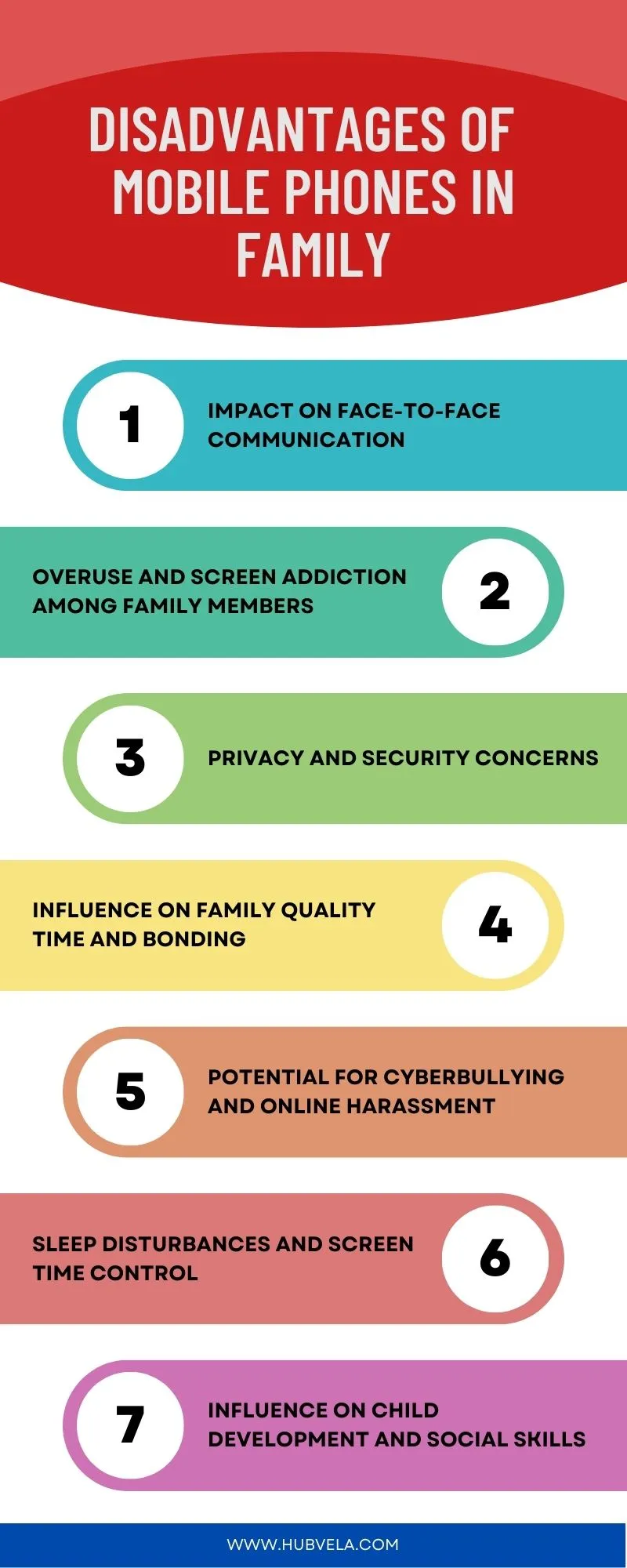Mobile phones have become an integral part of our lives, and they have revolutionized the way we communicate with each other. They have made communication easier and more accessible, but they have also brought some disadvantages.
In this article, we will explore the advantages and disadvantages of mobile phones in family life. We will look at how mobile phones can be beneficial for children and parents, as well as the potential drawbacks of excessive mobile phone use.

--Advertisement--
Advantages of Mobile Phones in Family
Mobile phones have become an integral part of our lives, and their benefits are undeniable. They have revolutionized the way we communicate, work, and entertain ourselves.
In recent years, mobile phones have also become an essential tool for families. Parents are increasingly buying mobile phones for their children, and there are many reasons why this is a good idea. We will explore the advantages of mobile phones in family life.

1. Improved Communication and Connectivity
Improved communication and connectivity are two of the most significant advantages of mobile phones in families. With the advent of smartphones, communication has become more accessible and convenient than ever before.
Family members can now stay in touch with each other through voice calls, video calls, and messaging apps, regardless of their location.
This has made it easier for families to stay connected and share important news and updates with each other.
Moreover, mobile phones have also made it possible for families to access the internet and social media platforms, allowing them to stay connected with friends and family members who live far away.
This has improved the overall connectivity of families and has made it easier for them to stay in touch with each other.
2. Coordination and Scheduling of Family Activities
Mobile phones have revolutionized the way families coordinate and schedule their activities. With the help of mobile phones, family members can easily communicate with each other and plan their activities without any hassle.
Mobile phones provide a quick and easy way to send messages, make calls, and share information about upcoming events. This makes it easier for families to stay organized and on top of their schedules.
Additionally, mobile phones allow family members to stay in touch even when they are not together physically. This is especially important for families with busy schedules or members who live far away from each other.
The coordination and scheduling of family activities has become much easier and more efficient thanks to the advantages of mobile phones.
3. Enhanced Safety and Emergency Communication
Mobile phones have become an essential tool for families, providing a range of benefits that enhance safety and emergency communication.
One of the most significant advantages of mobile phones is the ability to stay connected with loved ones at all times. In case of an emergency, mobile phones can be used to quickly call for help or to alert family members of a crisis.
Additionally, mobile phones can be equipped with features such as GPS tracking and emergency alerts, which can provide peace of mind for parents and caregivers.
With the ability to communicate instantly and access emergency services, mobile phones have become an indispensable tool for families seeking to enhance their safety and emergency communication.
4. Staying Connected with Family Members Anywhere
Mobile phones have revolutionized the way we communicate with our loved ones, allowing us to stay connected with family members anywhere.
One of the biggest advantages of mobile phones in the family is that they make it easier to maintain relationships with family members who live far away.
With video calling and messaging apps, we can see and talk to our loved ones in real-time, no matter where they are in the world. This is especially important for families who have members living in different countries or who travel frequently.
Mobile phones also make it easier to coordinate family events and activities, as we can quickly send messages or make calls to confirm plans.
Mobile phones have made it easier than ever to stay connected with family members, no matter where they are.
5. Convenient Sharing of Photos and Updates
Mobile phones have revolutionized the way families share photos and updates. With smartphones, users can post personal updates and photos while on the go.
The convenience of mobile phones allows family members to coordinate physical meetings through text messages.
Parents can use mobile phones to check on their children’s location or to report their own location. Smartphones also offer capabilities such as biometrics support, video chatting, and virtual assistants.
To ensure responsible phone use, parents can guide their children towards positive mobile phone use by encouraging healthy phone habits, sticking to rules about phone use, managing costs, keeping phones safe, and being safe and respectful in calls, texts, and social media posts.
Additionally, there are apps like TimeTree and Google Photos that allow families to share photos, videos, albums, and movies with any of their contacts, even if they don’t use the same app.
6. Access to Educational and Learning Resources
Mobile phones have become an essential tool for accessing educational and learning resources, especially for families who may not have access to traditional resources such as textbooks or libraries.
With the rise of mobile learning apps and online educational platforms, students can now access a wealth of information and resources at their fingertips.
Mobile phones also allow for easy communication between students and teachers, enabling them to ask questions and receive feedback in real time.
Additionally, mobile phones can be used to access online courses and webinars, providing opportunities for lifelong learning and professional development.
The advantages of mobile phones in families include increased access to educational and learning resources, which can help to bridge the gap in educational inequality and promote lifelong learning.
7. Entertainment and Leisure for Family Bonding
Mobile phones have become an integral part of our daily lives, and they have also brought about several advantages for families.
One of the significant benefits is that mobile phones provide a platform for entertainment and leisure activities that can be enjoyed by the whole family.
With the availability of various mobile applications, families can engage in games, watch movies, and listen to music together, which can help strengthen their bond.
Mobile phones also provide access to social media platforms, where families can share their experiences and connect with each other, even when they are physically apart.
Additionally, mobile phones can be used to plan and organize family outings and activities, making it easier for families to spend quality time together.
Mobile phones have revolutionized the way families interact and have made it easier for them to bond over shared interests and experiences.
Disadvantages of Mobile Phones in Family
Mobile phones have become an integral part of our daily lives, and it’s hard to imagine a world without them. However, the excessive use of mobile phones can have negative effects on family relationships.
Research has shown that mobile phones can distract people from connecting with each other in person, leading to less quality time spent together.
The negative effects of mobile phones on family life are numerous, and they include:

1. Impact on Face-to-Face Communication
Mobile phones have a significant impact on face-to-face communication within families.
According to a study by the Greater Good Science Center, the presence of a cell phone during social interactions decreases the quality of the conversation and the empathic connection that people feel toward each other.
The study also found that people talk about things where they wouldn’t mind being interrupted when a cell phone is present.
This means that the emotional importance of what people are willing to talk about decreases, and the connection that two people feel toward one another also decreases.
Another study found that people rate the quality of their conversations as “significantly higher” when smartphones are not present, regardless of age, ethnicity, gender, or mood.
Overusing cell phones and cell phone addiction are the compulsive companions to phubbing, and like phubbing, they are increasingly becoming.
Therefore, it is important to model and prioritize making meaningful connections through face-to-face communication.
2. Overuse and Screen Addiction Among Family Members
Mobile phones have become an integral part of our lives, but they also have some disadvantages, especially when it comes to family time.
Overuse and screen addiction among family members can lead to a lack of communication and bonding, which can negatively impact relationships.
Some people may feel a lack of control over their phone usage, constantly checking their phone without a real reason or feeling upset if they don’t have access to it.
Using a cell phone for work purposes during family time can also increase distress and strain on a family. Additionally, cell phones can cause never-ending interruptions, leading to disinterest in family time and decreased attention span.
Teenagers may be particularly susceptible to the negative effects of mobile phones, including decreased sleep, distractibility, and poorer academic performance.
Therefore, it is important to consider the disadvantages of mobile phones and find ways to balance technology use with quality family time.
3. Privacy and Security Concerns
Mobile phones have become an integral part of our lives, but they also come with privacy and security concerns. With the increasing use of mobile phones, the risk of cyber-attacks and identity theft has also increased.
Hackers can gain access to personal information, such as bank account details, passwords, and social security numbers, through mobile phones.
Moreover, mobile phones can be easily lost or stolen, which can lead to the loss of sensitive information. In addition, mobile phones can be used to track the location of individuals, which can be a privacy concern for many.
Therefore, it is important to take necessary precautions, such as using strong passwords, avoiding public Wi-Fi, and installing security software, to protect personal information and privacy.
4. Influence on Family Quality Time and Bonding
Mobile phones can have a negative impact on family quality time and bonding. According to, excessive cell phone usage can hurt family relationships by taking away from other things, being addictive, and being rude.
Parents using their phones for work purposes during family time can increase distress and strain on a family.
People who have trouble putting away their phones might feel a lack of control over how often they pick up their phone or how long they use it.
They might feel the need to constantly check it without a real reason or feel upset if they don’t have access to the phone.
Quality time together strengthens family resilience, and people rate the quality of their conversations as “significantly higher” when smartphones are not present, regardless of age, ethnicity, gender, or mood.
Therefore, it is important to assess how much you use your own phone when you’re together with your family and cut back if necessary.
5. Potential for Cyberbullying and Online Harassment
Mobile phones have the potential to increase cyberbullying and online harassment. Cyberbullying is the use of technology to harass, threaten, embarrass, or target another person.
According to the Australian Covert Bullying Prevalence Study, one child in 10 has experienced cyberbullying, which is bullying through electronic channels such as mobile telephones.
Research has found that giving a young child a cell phone increases the likelihood that the child will either become a victim of bullying or a bully themselves.
Teenagers with problematic use of new technologies have been associated with increased bullying and cyberbullying problems.
Mobile devices such as phones, tablets, and notebooks that have wireless capabilities can be linked to cyberbullying rates among young people.
Parents can encourage their children to ignore all contact and use the phone’s privacy settings to block the bully. They should also report unwelcome contact to the relevant authorities.
6. Sleep Disturbances and Screen Time Control
Excessive use of mobile phones, particularly smartphones, can lead to sleep disturbances in children, adolescents, and young adults.
The blue light emitted by screens can interfere with the body’s natural sleep-wake cycle, making it difficult to fall asleep and stay asleep. Sleep hygiene measures specific to social media and smartphone usage are crucial to prevent sleep disturbances.
The more time spent watching screens, the more likely children are to have trouble falling asleep or have an irregular sleep schedule.
Parents should monitor their children’s screen time and establish rules to limit it, particularly before bedtime.
It is important to note that sleep disturbances are just one of the many negative impacts of excessive mobile phone use, which also include impaired cognitive function, poor communication skills, and reduced face-to-face interactions.
7. Influence on Child Development and Social Skills
The increasing use of smartphones and social media is changing the way kids develop social skills. Technology decreases the amount of face-to-face interaction and increases the amount of communication done from behind a screen.
One study by UCLA found that excessive screen time may have negative effects on a child’s ability to understand emotions. The researchers found that “routine and frequent use of mobile devices appear to be associated with behavioral problems in childhood”.
According to a Common Sense Media study reported by NPR, more than half of children under the age of 11 now own a smartphone.
As a result, parents and researchers have begun exploring the positive and negative effects of smartphones on child development.
First, frequent mobile device use is likely to increase children’s social isolation and hinder opportunities for social interaction with family.
When children spend more time looking at a mobile device, it means they have less time interacting face to face with other people.
Moreover, if a child relies on electronic devices like smartphones to communicate, they risk losing their social skills. The drawbacks of smartphone use on children have received attention in recent years.
In academia, journalism, and other popular forms of media, there has been a growing concern about the ways that children have increased access to smartphone technology.
Conclusion on Advantages and Disadvantages of Mobile Phones in Family
In conclusion, mobile phones have both advantages and disadvantages in family relationships. On one hand, they can increase the quality of communication among family members who live separately at a distance.
On the other hand, excessive use of mobile phones can distract family members from connecting with each other in person.
Cell phones can also lead to social isolation and diminish close family relationships. It is important for families to assess their own cell phone use and create rules that work for everyone.
However, the age at which children acquire their first cell phone does not seem to be a key factor in their well-being. Ultimately, families should use their best judgment about how to balance the benefits and drawbacks of mobile phones in their relationships.


